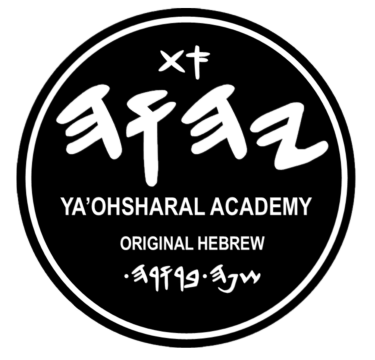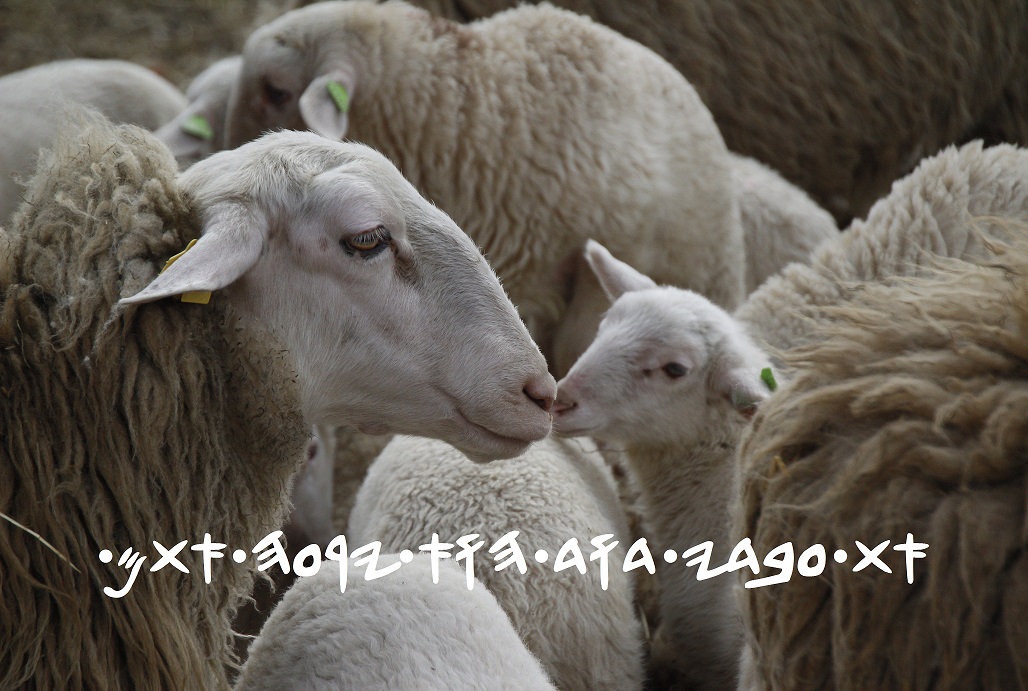
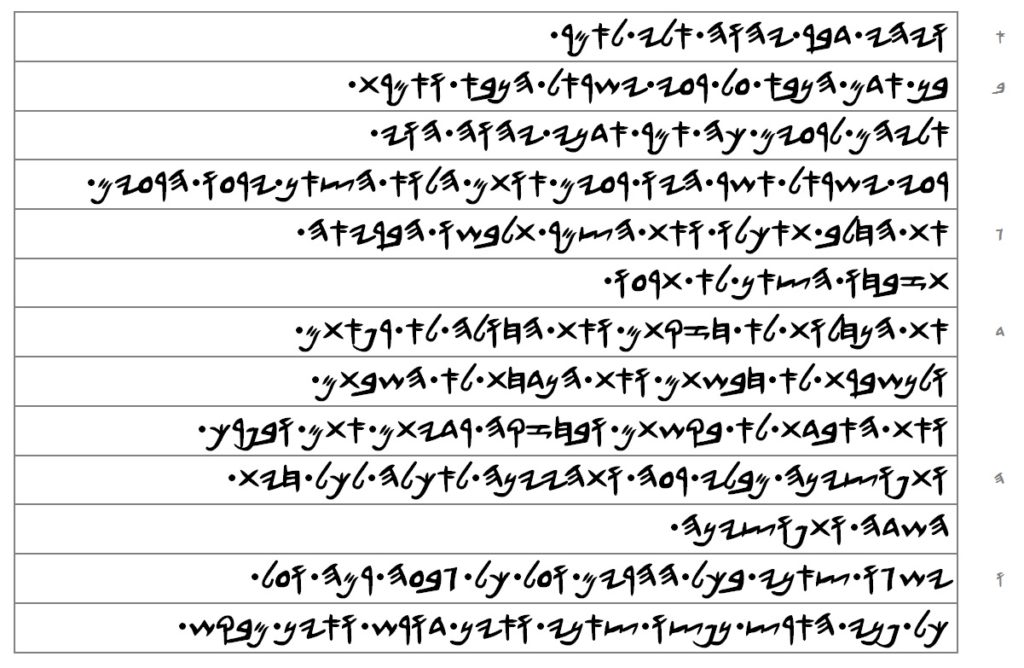
[1] wA-yah’ay dabar YA’OH alay la-amar
And it came to be, the word of YA’OH to me, saying:
[2] ban adam hanab’ ghal rai’ay Ya’oh-shar-al hanab’ wA-amartha alay-ham la-rai’aym chah amar adanay YA’OH ho’ay rai’ay Ya’oh-shar-al ashar hay’o rai’aym ‘otham ha-lo’ ha-tsa’an yarai’o ha-rai’aym
Son of man, prophesy against the shepherds of Ya’oh-shar-al. Prophesy and say to them, to the shepherds, thus says Lord YA’OH: Ho’ay! shepherds of Ya’oh-shar-al which were the ones feeding themselves. Is not the flock fed by the shepherds?
[3] ath ha-khalab tha’achalo wa-ath ha-tsamar thalabasho ha-baray’ah thazabakho ha-tsa’an la tharai’o
the fat have you eaten, and the wool have you dressed in; the one that is well fed will you sacrifice; the flock not will you shepherd;
[4] ath ha-nakhaloth la khazaktham wa-ath ha-kholah la rap’atham wa-la-nashabarath la khabashtham wa-ath ha-nadakhath la hashbatham wa-ath ha’abadath la bakashtham wa-bakhazakah radaytham atham wa-ba-parach
the diseased not have you strengthened them; and the sick not have you healed them; and the broken ones not have you bound them; and the ones driven away not have you returned them; and the ones that are lost not have you searched them; but by power have you ruled them, and by rigor;
[5] wA-thapotsaynah ma-balay raih wA-thah’ay’aynah la-achalah la-chal khayth ha-shadah wA-thapotsaynah
and they were scattered without a shepherd; they became for food to every animal of the field and they were scattered
[6] yashago tsa’anay ba-chal ha-haraym wa-ghal chal gabaih ramah wa-ghal chal panay ha-arats napatso tsa’anay wa-ayn dorash wa-ayn mabakash
they went astray, my flock, in all of the mountains and upon every hill high, and upon all the face of the earth; they were scattered, my flock, and there is not one who seeks, and there is not one who searches.
COMMENTARY OF YA’OH-KHAZAK-AL 30:1-6
[Verse 1] This particular word of YA’OH coming to the prophet-priest Ya’oh-khazak-al (Ezekiel) is dated in chapter 33 and verse 21. It was the 12th year of the captivity which began on New Year’s Day 1.1.4643 (i.e. Wednesday, Julian April 12, 587 BCE); the 10th month of the year, and the 5th day of the month, 10.5.4643 (i.e. Sunday, Julian January 14, 586 BCE). The city of Yaroshalam fell and was captured six months earlier on 4.9.4643 (i.e. Thursday, Julian July 20, 587 BCE). Hence it took 179 days for the news of Yaroshalam’s fall to reach Ya’oh-khazak-al in Babylonia. It is important to know this information because Ya’oh-khazak-al 34 begins to prophesy about false shepherds of Ya’oh-shar-al, and since the people were removed from the promised land by the Babylonians, the shepherds will have to be shepherds who exercise authority over the people while they are in one of the lands of their captivity and not in the promised land.
[Verse 2] False shepherds cannot feed on a flock if the flock has nothing to offer. Hence this captivity that the prophet is foreseeing will be one where the flock end up doing well for themselves in the land of their oppressor. Keep this in mind.
[Verse 3] The flock will be fat, meaning they will have money in this captivity; and they will have wool, meaning they will obtain material possessions in this captivity; and the false shepherds will feed on their fat and clothe themselves in their wool, and neglect to care for the flock. Always taking and never giving back. There is no record of the people of Ya’oh-shar-al being mistreated by their own shepherds during the Assyrian or the Babylonian captivities, both of which ended in 519 BCE with the decree issued by Cyrus the Great. The prophet is looking beyond those eras of history and peering into the lengthy exile initiated by the Romans at the conclusion of the great war in the promised land from 66-70 CE.
[Verse 4] During this current Roman induced exile which has lasted 1,953 years already there will be sheep doing well financially, but there will also be diseased sheep, sick sheep, wounded sheep, driven away sheep, and lost sheep. The false shepherds will do nothing for any of the sheep except exploit them.
[Verse 5] This verse is talking about a scattering of our people from the promised land at a time when they will have no shepherd, not even a bad one. This can only be describing the scattering caused by the Romans in 70 CE.
In the fall of 66 CE the people of Ya’oh-shar-al joined in revolt, expelled the Romans from Yaroshalam, and overwhelmed in the pass of Beth-Horon a Roman punitive force under Gallus, the imperial legate in Syria. A revolutionary government was then set up and extended its influence throughout the whole country, but sharp divisions within the government, there being no single leader, was the weakness that allowed Vespasian, who was dispatched by the Roman emperor Nero, to crush the rebellion. Vespasian was joined by his son Titus, and together the Roman armies entered Galilee, where the historian Josephus headed the Ghabaraym (Hebrew) forces. Josephus’ army was confronted by that of Vespasian and fled. After the fall of the fortress of Jatapata, Josephus gave himself up, and the Roman forces swept the entire country. On the 9th of the month of Av (August 29) in 70 CE, Yaroshalam fell; the Temple built by Herod the Great was burned, and the revolution collapsed, although the fortress of Masada was not conquered by the Roman general Flavius Silva until April 73 CE.
[Verse 6] Again, only the Roman scattering of 70 CE caused the people of Ya’oh-shar-al to wander the entire world. This verse supplies us with an indirect reference to the New World and the United States of America. For if the people are to be forcibly driven to every land upon all the face of the earth then this must logically include the New World, and the only people forcibly driven to the New World en masse are the children of the trans-Atlantic slave trade.
In other words, the scattering of 70 CE eventually resulted in the largest forced migration in human history when slaves were shipped across the infamous Middle Passage of the Atlantic Ocean during slavery beginning in the 16th century. Only those people are the people of Ya’oh-shar-al or there are no people of Ya’oh-shar-al in the New World since every race of people in the New World, with the exception of the black slaves, arrived there using their own free will. If the black slaves were just Africans, since they admittedly looked like other Africans, dressed like other Africans, and spoke African dialects, why then did no Africans ever come looking for them? The truth is because they were the slaves of Africans, expendables, and not their family members. This verse tells us that the people who will have no one to come looking for them after being forcibly scattered into foreign exile will be the children of Ya’oh-shar-al. There is only one race of people in the Americas who fit that description.
The so-called Jews who came to the New World came looking for opportunity, and now they have a whole state in the so-called Middle East which looks for them and invites all of them to come settle, and even offers financial assistance in order for them to do so. They did not come to the New World in chains. We did. And we are the only ones who did. And no one has ever come looking for us while we were in those chains. Africans have only recently shown an interest in us because some of us are now very well off, like fat sheep, and Africans want those of us who are financially well off to move to their country because that will strengthen their economy. The false pretense of brotherhood comes with a not so hidden agenda.
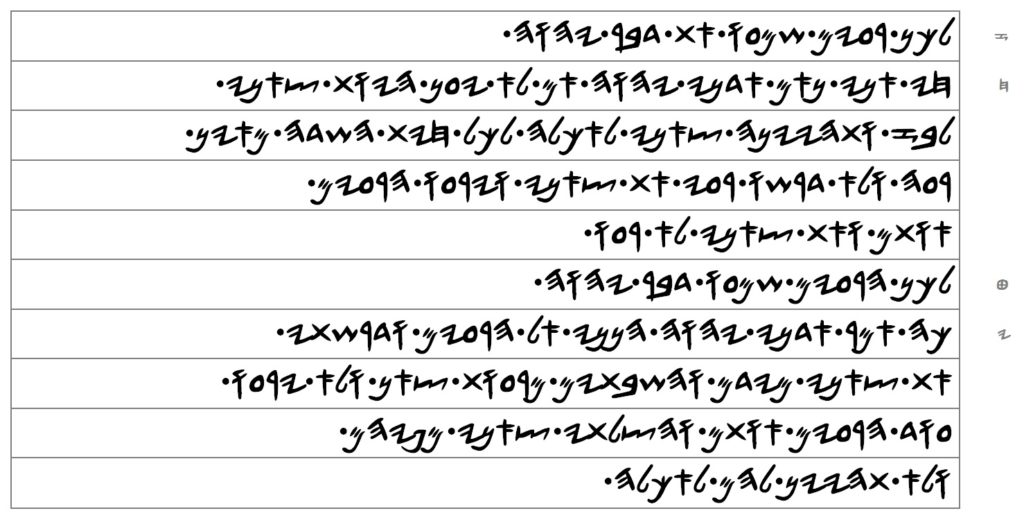
[7] lachan rai’aym shamai’o ath dabar YA’OH
therefore, shepherds, hear the word of YA’OH
[8] khay anay na’am adanay YA’OH am la yain hay’oth tsa’anay la-baz wA-thah’ay’aynah tsa’anay la-achalah la-chal khayth ha-shadah ma-ayn raih wa-la darasho rai’ay ath tsa’anay wa-yarai’o ha-rai’aym ‘otham wa-ath tsa’anay la rai’o
As live I, says Lord YA’OH, if not because it became my flock for prey, and they became my flock for food for every animal of the field; since there is no shepherd, and not did they search, my shepherds, my flock; and they fed, the shepherds, themselves and my flock not have they fed.
[9] lachan ha-rai’aym shamai’o dabar YA’OH
therefore, the shepherds, hear a word of YA’OH
[10] chah amar adanay YA’OH hananay al ha-rai’aym wa-darashthay ath tsa’anay ma-yad-am wA-hashbathay-m ma-rai’oth tsa’an wa-la yarai’o ghod ha-rai’aym ‘otham wA-hatslathay tsa’anay ma-pay-ham wa-la thah’ay’aynah la-ham la-achalah
thus says Lord YA’OH, behold I am against the shepherds, and I will search my flock from their hand, and I will cause them to cease from feeding the flock; and not will they feed anymore, the shepherds, themselves; and I will deliver my flock from their mouth; and not will they be for them for meat.
COMMENTARY OF YA’OH-KHAZAK-AL 30:7-10
[Verse 7] The false shepherds are now coming into clear focus. They are the black religious leaders the children of the trans-Atlantic slave trade have had since the end of slavery in the 19th century, i.e. the black church, the black mosque, and the black Christian Hebrews, etc.
[Verse 8] There has been no greater tool in the hand of our oppressor in that land than the institution of black religion. Black preachers and pastors have historically used black religion as a stepping stone to enrich themselves and to keep the masses of black people entertained, and submissive to their white oppressor. There is a church on almost every corner in black neighborhoods in America, and these churches collect millions of dollars from the black community, but none of this money is ever used to improve the lives of black people in their communities. It is appalling to say the least, but it is a fact. If verse 8 is not talking about this fact, it is not talking about anything, because there is simply nothing like this happening among any other race of people in the New World except the children of the trans-Atlantic slave trade. Their shepherds, and only their shepherds, are the ones doing exactly what the prophet Ya’oh-khazak-al is condemning in verse 8.
[Verse 9] The only differences between verse 7 and verse 9 is that in verse 7 the masculine plural noun rai’aym (shepherds) is not prefixed by the definite article ha- (the), and verse 9 omits the definite direct object marker ath before the construct phrase dabar YA’OH (word of YA’OH). The subtle differences are intentional. Verse 7 introduces verse 8 where the charges against the false shepherds are listed, and verse 9 introduces verse 10 where the sentencing of the false shepherds is given. Being charged with a crime means that YA’OH has formally accused the false shepherds with a crime. The sentence is the punishment YA’OH decides will be given to the false shepherds who have been convicted of a crime.
[Verse 10] wa-darashthay ath tsa’anay ma-yad-am (and I will search my flock from their hand). YA’OH is against the false religious shepherds of black people, and He will seek out and remove His flock from their hand, i.e. from their congregations. This is exactly what is happening now. The flock of YA’OH consists of those children of the trans-Atlantic slave trade who return to keep the commandments of His covenant and who call upon His correct name. The correct name has only recently been re-introduced as of the year 7246 (2017) via a ravenous bird in the east, and that man is being used by YA’OH to lead an Exodus of His flock out of the New World, the land of pyramids, to the second wilderness where they will no longer be meat for the beasts of the wild and no longer be meat for the false shepherds of their own race.
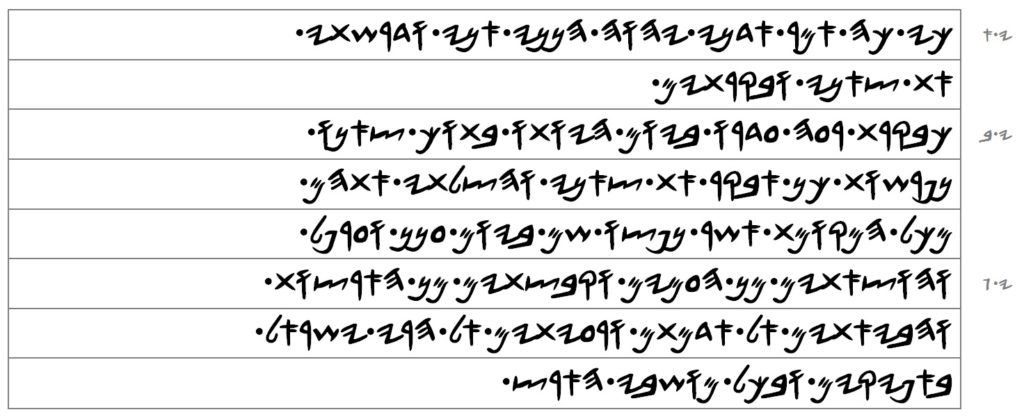
[11] chay chah amar adanay YA’OH hananay anay wA-darashthay ath tsa’anay wA-bakarthay-m
For thus says Lord YA’OH: Behold I, I will search my flock, and I will seek them.
[12] cha-bakarath raih ghadaro ba-yom hay’otho bathoch tsa’ano naparashoth chan abakar ath tsa’anay wA-hatsalthay ath-ham ma-chal ha-makomath ashar napatso sham ba-yom ghanan wa-gharapal
As the search of the shepherd of his fold, in the day of him being among the flock, the scattered ones, so will I seek my flock, and I will deliver them from out of all the places which they were scattered there in the day of the cloud and of the thick darkness.
[13] wA-hotsathay-m man ha-ghamaym wA-kabatsthay-m man ha-aratsoth wA-habay’athay-m al adamath-am wA-rai’aythay-m al haray Ya’oh-shar-al ba-apaykaym wa-ba-chal moshabay ha-arats
and I will bring them out from the nations, and I will gather them out from the lands, and I will bring them to a land of their own, and I will feed them to mountains for Ya’oh-shar-al, by channels and in all dwellings of the country.
COMMENTARY OF YA’OH-KHAZAK-AL 34:11-13
[Verse 11] YA’OH Himself is doing the searching and seeking, but He always uses a man to be His servant and facilitator of His redemptive work to bring a captivity to an end. There was Mashah (Moses) for the Exodus to the first wilderness. There was Zarababal (Zerubbabel) for the second time at the return from the Babylonian exile. There is now a ravenous bird for the Exodus to the second wilderness.
[Verse 12] The day YA’OH comes among the flock to do a seek and search rescue operation for the scattered ones is the day He brings His name back into the world from far away and after a very long absence and He begins to bind up the breach of their wound (Yashai-Ya’oh 27:29-30). That day began in the Year 7246 (2017) and it is culminating this Year 7252 (2023) with an Exodus to the second wilderness.
The clause ba-yom ghanan wa-gharapal (in the day of the cloud and of the thick darkness) refers to the darkest time in history for our people. The darkest time for the so-called Jews was the German Holocaust. For our people it was the trans-Atlantic slave trade, a far greater darkness than the Holocaust, claiming the lives of many more millions of people over a much longer period of time. It was orchestrated by YA’OH to bring His people by ships to the land of pyramids and scatter them in the New World to be punished (Thorah 5.28:68), and now He is reversing that greatest of our curses by extracting a remnant and bringing it to the second wilderness.
[Verse 13] YA’OH cornered His people in the New World during slavery and erased their memory: amarthay apa’ay-ham ashbaythah ma-anosh zachar-am, “I said I will corner them, that I may cause to cease from men the memory of them” (Thorah 5.32:26). He did that to us, and now He is bringing select ones out from the nations in the New World, and gathering select ones out from the lands of the New World, and He is bringing them to a land of their own (in the second wilderness).
The people will be fed al haray Ya’oh-shar-al (to mountains for Ya’oh-shar-al). The mistranslation of the preposition al (to) followed by the construct phrase haray Ya’oh-shar-al (mountains for Ya’oh-shar-al) in the 1611 Queen James Virus (“upon the mountains of Israel”) and other English bibles is misleading people into thinking that the redeemed exiles will go straight to the promised land from the lands of their captivity without having a stop over in a wilderness located outside the borders of the New World. This is a lie based on mistranslations of the biblical text.
It also makes the prophet Ya’oh-khazak-al look like he is contradicting himself when he is not. He has already stated in chapter 20 and verse 35 that exiles will be gathered to the madbar ha-ghamaym (wilderness of the nations) prior to their final return to the promised land. As the phrase suggests, the madbar ha-ghamaym is that region of the world where all races of people can trace their lineages back to, i.e. the original habitat of man in the garden of Ghadan (Eden) in the east. The worldwide flood of Nakh (Noah) destroyed the garden of Ghadan and today it is a madbar yam (wilderness of the sea) frequented by storms (Yashai-Ya’oh 21:1), meaning it is an archipelago of islands in the east where tropical cyclones happen regularly. It is also the place where a ravenous bird brought forth the name (Yashai-Ya’oh 24:15; 41:25; 46:11) seven years ago, and this place in the east is none other than the 7,100 islands of the Philippine archipelago.
ba-apaykaym wa-ba-chal moshabay ha-arats (by channels and in all dwellings the country). The primary location of the redeemed in the second wilderness will be up high in the wooded mountains, but they will also have access to all other dwellings in the country. These lowland areas with abundant water sources will be needed in order for the remnant to grow their own food and to maintain their own livestock since the mountains are not ideal for growing crops and raising farm animals. Mountainous regions are subject to natural constraints that hinder the productivity of farming.
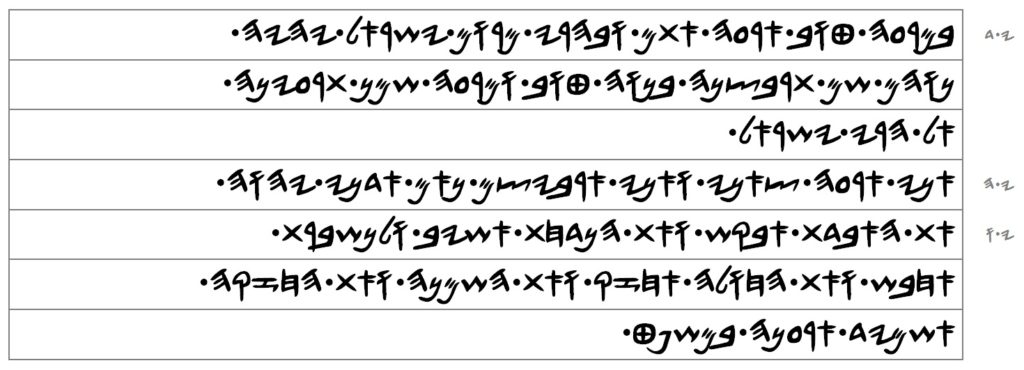
[14] ba-maraih tob araih atham wa-ba-haray marom Ya’oh-shar-al yah’ayh no-ham sham tharabatshnah ba-noh tob wa-maraih shaman tharai’aynah al haray Ya’oh-shar-al
and in a good pasture will I feed them, and on mountains high for Ya’oh-shar-al will it be the habitation of them; there will they recline in a good habitation; and a fat pasture will they feed to mountains for Ya’oh-shar-al.
[15] anay araih tsa’anay wa-anay arabayts-am na’am adanay YA’OH
I, I will feed my flock, and I will cause them to lie down, says the Lord YA’OH
[16] ath ha-abadath abakash wa-ath ha-nadakhath ashayb wa-la-nashabarath akhabash wa-ath ha-kholah akhazak wa-ath ha-shamanah wa-ath ha-khazakah ashmayd arainah ba-mashpat
The lost will I seek, and the driven away will I return, and the broken will I bind up, and the sick will I strengthen; and the fat and the strong will I destroy; I will feed with judgment.
COMMENTARY OF YA’OH-KHAZAK-AL 34:14-16
[Verse 14] The remnant will be nourished in a good pasture, and on mountains high for Ya’oh-shar-al will their city Tsayon and Yaroshalam be built by Chorash their leader (Yashai-Ya’oh 45:13). The prophet keeps repeating the phrase haray Ya’oh-shar-al (mountains for Ya’oh-shar-al) because the remnant in the second wilderness will be known as mountain nations and they will restore the sacrifices to YA’OH in those mountains: ghamaym har yakara’o sham yazabakho zabakhay tsadak, “mountain nations will they call; there will they sacrifice sacrifices of righteousness” (Thorah 5.33:19).
[Verse 15] The redundancy in verse 15 is for emphasis. It expresses the determination of YA’OH to do what He says He will do.
[Verse 16] Unlike the false shepherds of Ya’oh-shar-al in the captivity, all of them being black religious leaders teaching lies in order to exploit the flock, YA’OH will seek the lost; He will recover the driven away; He will bind up the broken; and He will strengthen the sick. Moreover, He will destroy the fat, meaning the financially well off sheep of His people and their false shepherds who He did not gather out of the New World and bring them to the second wilderness. He will also destroy the strong, meaning the oppressor, i.e. the Europeans and other peoples He used to punish and to afflict Ya’oh-shar-al in the New World. He will destroy them and feed them judgment after He has finished gathering His remnant to the second wilderness.
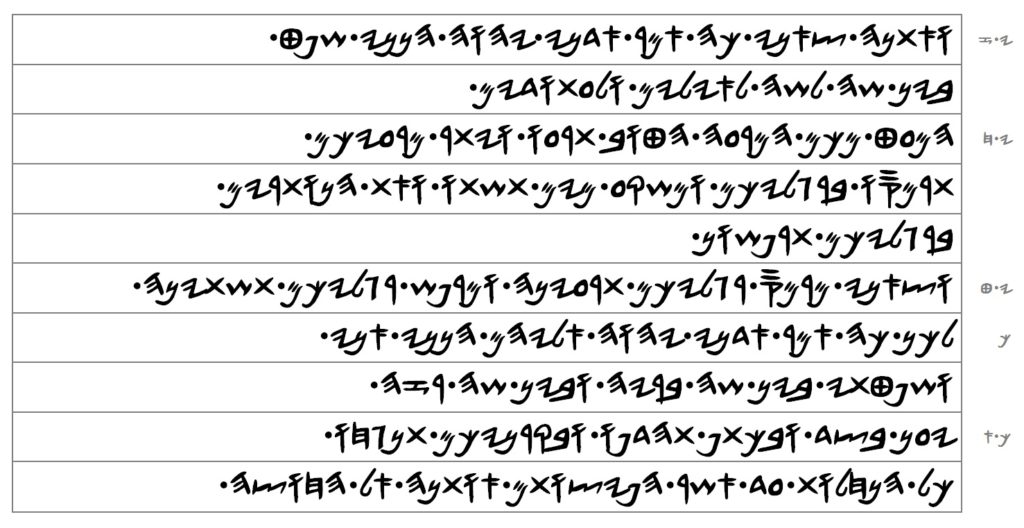
[17] wa-athanah tsa’anay chah amar adanay YA’OH hananay shapat bayn shah la-shah la-aylaym wa-la-ghathodaym
and you my flock, thus says Lord YA’OH: Behold I am the one judging between sheep for sheep, for rams and for goats.
[18] ha-mait ma-cham ha-maraih ha-tob tharai’o wa-yathar marai’ay-cham tharamaso ba-ragalay-cham wa-mashkai maym thashatho wa-ath ha-notharaym ba-ragalay-cham tharapashon
is it smaller than you, the good pasture you will feed, and the rest of your pastures you will trample down by your feet; and deep waters you will drink and the remaining ones by your feet you will stomp foul?
[19] wa-tsa’anay marmas ragalay-cham tharai’aynah wa-marpash ragalay-cham thashathaynah
and my flock, the trodden of your feet will they feed, and stomped foul of your feet will they drink.
[20] lachan chah amar adanay YA’OH alay-ham hananay anay wA-shapat-thay bayn shah barayh wa-bayn shah razah
therefore, thus says Lord YA’OH unto them: Behold I, I will judge between fat sheep and between lean sheep.
[21] yain ba-tsad wa-ba-chathap thahdapo wa-ba-karanay-cham thanagakho chal ha-nakhaloth ghad ashar hapaytsotham ‘othanah al ha-khotsah
because by side and by shoulder will you thrust out, and by your horns will you gore all the infected ones until which you have scattered them to the outside
COMMENTARY OF YA’OH-KHAZAK-AL 34:17-21
[Verse 17] The flock of YA’OH is His righteous remnant. Verses 17-21 tell us that YA’OH is going to judge between different kinds of animals who represent people and use His flock to destroy all of the animals who are not part of His fold.
[Verse 18] Verse 18 are rhetorical questions. ha-mait ma-cham (is it smaller than you), or is it beneath you, i.e. is the conduct of feeding in the good pasture of the second wilderness on high mountains for Ya’oh-shar-al while at the same time you are trampling down those former pastures in the New World where you exited in order to go to the second wilderness unbecoming of you? The answer is: no, no it is not. It is called justice. Does the behavior of enjoying deep and plentiful waters in the second wilderness while at the same time you are stomping the remaining waters in the New World foul not suit the character and the status of the redeemed? The answer is: yes, yes it does. It is called justice.
The prophets tell us over and over again how YA’OH is planning to use His remnant as His instrument of war to exact His revenge upon all those who have had a hand in their oppression. That judgment will be worldwide, but the United States of America in the New World, the strongest nation in human history with our blood on its hands, is the primary target.
[Verse 19] This verse tells us there will be people feeding upon and drinking from what the flock of YA’OH in the second wilderness have trampled and stomped foul with their feet. These people are the oppressors, the beasts of the wild who once fed upon the flock of YA’OH as prey and used the false religious shepherds of our people as their knife and fork.
[Verse 20] Redundancy for emphasis once again. YA’OH is absolutely determined to do what He says.
[Verse 21] This verse gives the visual of sheep establishing their dominance by head-on collisions. These dramatic clashes involve each ram getting a running start before colliding, horns-first into one another. The flock of YA’OH will full contact side check, shoulder tackle, and ram all infected sheep and drive them into oblivion. This is the destruction of the whole world and all of the world’s armies (Yashai-Ya’oh 13:1-5; 34:1-4) and YA’OH will bring this about via His people when they are all gathered to the second wilderness. Babal (the United States of America) and Adom (the west African peoples who sold us to Europeans during slavery) will be destroyed simultaneously.
Another prophet puts it this way:
komay wa-doshay bath Tsay’on chay karan-ach ashaym barzal wa-parasthaych ashaym nakhoshah wa-hadakoth ghamaym rabaym wa-hakhramthay la-YA’OH ba-tsaim wa-khayl-am la-adon chal ha-arats
Arise and thresh, daughter of Tsay’on, for your horn will I make iron, and your hoof will I make copper, and you will cause to be beaten into pieces many nations, and I will devote unto YA’OH their gain, and their wealth to the Lord of the whole earth” (May’chah 4:13).
The threshing by the redeemed daughter of Tsay’on will commence once the current Exodus is finished and when the remnants of Ya’oh-shar-al have all been gathered to the second wilderness for a time, times, and a half (Danay’al 12:7).
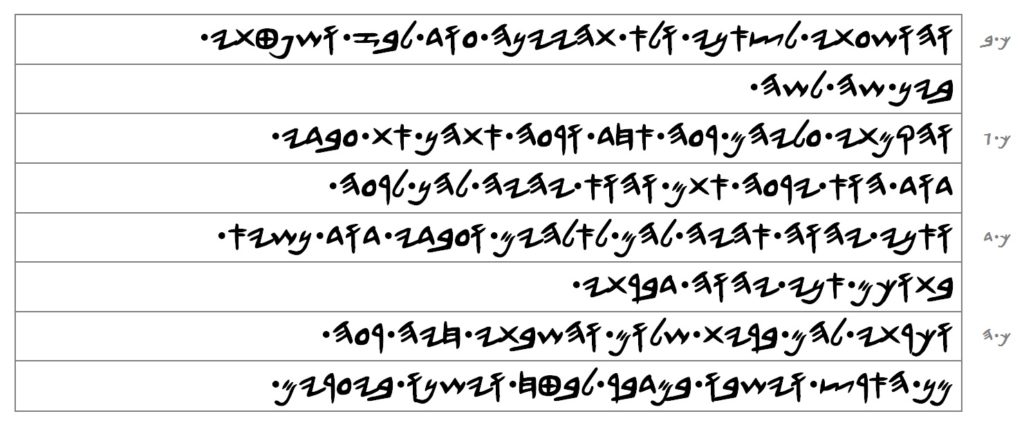
[22] wA-hoshaithay la-tsa’anay wa-la thah’ay’aynah ghod la-baz wA-shapat-thay bayn shah la-shah
and I will save to my flock, and not will they be anymore for prey; then will I judge between sheep to sheep.
[23] wA-hakamthay ghalay-ham raih akhad wA-raih ath-han ath ghabaday dod ho’ yaraih atham wa-ho’ yah’ayh la-han la-raih
and I will raise up upon them one shepherd, and he will feed them; my servant Beloved; he will feed them and he will be to them for a shepherd.
[24] wa-anay YA’OH ah’ayh la-ham la-alah’aym wa-ghabaday dod nashay’ bathoch-am anay YA’OH dabarthay
and I YA’OH, I will be to them for a Higher Power, and my servant Beloved is the chief in the midst of them; I YA’OH have spoken.
[25] wA-charathay la-ham barayth shalom wA-hashbathay khayh raihh man ha-arats wA-yashabo ba-madbar la-batakh wa-yashano ba-yairaym
and I will cut for them a covenant of shalom; and I will cause to cease the dangerous animal from out of the country; and they will dwell in the wilderness for safety, and they will sleep in the wooded mountain heights.
COMMENTARY OF YA’OH-KHAZAK-AL 34:22-25
[Verse 22] YA’OH saves His flock by bringing them out of the land of pyramids in the New World to the second wilderness where they will not be prey anymore. Then the judgment of those animals who were not gathered will begin.
[Verse 23] YA’OH will take His flock away from the false shepherds in the New World and put them under a good shepherd in the second wilderness in the far east. The word dod (beloved) in this verse and in verse 24 is NOT a proper name. It is a title, an epithet, and a term of endearment. The heathen translations making it a proper name have created the false impression that King Do’ayd (David) will return from the dead to be king once again, and this simply is not the case. The covenant YA’OH made with Do’ayd is that a son of his would reign, not that Do’ayd himself would reign for ever (Yaram-Ya’oh 33:21).
[Verse 24] There are in fact two men who the prophet Ya’oh-khazak-al calls dod (beloved) in his writings. The first man is mentioned here in verses 23-24 and again in Ya’oh-khazak-al 37:22-24. Let’s look at Ya’oh-khazak-al 37:22.
wA-ghashaythay atham la-go’ay akhad ba-arats b’haray Ya’oh-shar-al wa-malach akhad yah’ayh la-chal-am la-malach wa-la yah’ay ghod la-shany go’aym wa-la yakhatso ghod la-shathay mamlachoth ghod
and I will make them for one people in the land, in mountains for Ya’oh-shar-al, and one king will be to all of them for a king, and not will it be anymore for two peoples; and not will they be divided anymore for two kingdoms again (Ya’oh-khazak-al 37:22).
This unity of the nation of Ya’oh-shar-al under one king in the land where mountains will be for Ya’oh-shar-al is the unity that takes place among the remnant in the second wilderness. Their one king who is called dod is an interim king in the second wilderness, and his reign will come to an end. An interim king is a person appointed to govern a state for the time being because the heir to the throne is physically absent. The nickname of the interim king is Chorash (Yashai-Ya’oh 45:4) and his character is that of a ravenous bird (Yashai-Ya’oh 46:11). He is the appointed leader of the Exodus (Hoshai 1:11) and the remnant follow him to the wilderness where he has already gone ahead before any of them get there (May’chah 2:12-13).
The other man who is called dod is the absent heir to the throne. He doesn’t come onto the scene to claim his throne until after the remnant leaves the second wilderness and returns to the promised land. He will ascend the throne of his father Do’ayd in the promised land, and his reign will never come to an end (Ya’oh-khazak-al 37:25). This is the sharash Yash-Ya’oh (root of Jesse) and his rest will be glorious (Yashai-Ya’oh 11:10).
In Ya’oh-khazak-al chapter 37 the place where the first dod is king of the people is in a land of their own with mountains, but this land is not called the promised land (Ya’oh-khazak-al 37:22-24). The land where the second dod is king for ever is specifically called the land YA’OH swore to give to the Patriarchs and to their seed (Ya’oh-khazak-al 37:25). This is how we know that two different men are being called dod in two different lands by this prophet in his book. He does not tell us that the remnant will go into the land of the second wilderness and not have a man appointed by YA’OH to be their leader. That leader is mentioned and he will set up an organized and structured system of righteous government in the second wilderness (Yashai-Ya’oh 32:1). The kingdom of YA’OH was established in the first wilderness under the leadership of Mashah. The revival of that kingdom takes place in the second wilderness under the leadership of the man nicknamed Chorash.
[Verse 25] This verse removes all doubt and makes it absolutely clear that the land the prophet is talking about where the remnant will settle after their Exodus, and have a land of their own there, is a land in the madbar (wilderness) and not in the promised land. Their habitation will be located way up in the yairaym (wooded mountain heights) of the wilderness where they will sleep without having a care in the world, totally safe and sound. Therefore, the phrase haray Ya’oh-shar-al that keeps being repeated in this chapter are mountains upon which Ya’oh-shar-al will live in the second wilderness. They are not to be confused with the mountains of the promised land.
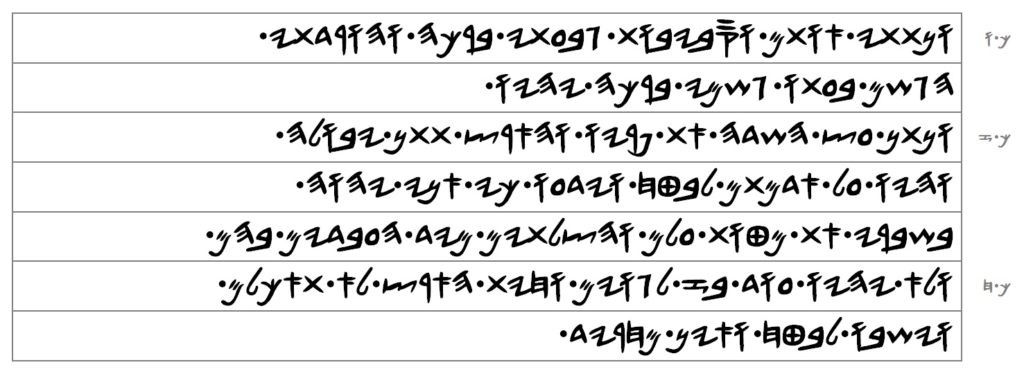
[26] wA-nathathay ‘otham wa-sabayboth gabaithay barachah wA-horadthay ha-gasham ba-ghath gashamay barachah yah’ay’o
and I will give them, and the places round about my hill a blessing; and I will cause to come down the rain in its season, rains of blessing will they be.
[27] wA-nathan ghats ha-shadah ath paray’o wa-ha-arats thathan yabol-ha wA-hay’o ghal adamath-am la-batakh wA-yadai’o chay anay YA’OH ba-shabar-ay ath matoth ghalam wA-hatsalthay-m ma-yad ha-ghabadaym ba-ham
and I will give the tree of the field its fruit, and the land will yield the increase of her, and they will be upon a land of their own for safety; and they will know that I am YA’OH when I break the bands upon them, and I will deliver them from the hand of the ones who served themselves in them
[28] wa-la yah’ayo ghod baz la-go’aym wa-khayth ha-arats la tha’achal-am wA-yashabo la-batakh wa-ayn makhrayd
and not will they be anymore a prey to peoples; and the beast of the earth, not will it devour them; and they will dwell in security; and there is none making afraid.
COMMENTARY OF YA’OH-KHAZAK-AL 34:26-28
[Verse 26] wA-nathathay ‘otham wa-sabayboth gabaithay barachah (and I will give them, and the places round about my hill a blessing). Not only the flock of YA’OH in the second wilderness but also those places around His hill, meaning the places where strangers live in the country of the second wilderness, will receive a blessing (Tsapan-Ya’oh 3:12).
[Verse 27] Trees will bear their fruit, and their farmlands will yield their increase. The flock of YA’OH will dwell upon a land of their own in the complete assurance of safety while the whole world outside the country of the second wilderness is plunged into darkness and destruction.
[Verse 28] The promise of living in safety and security in the second wilderness is also stated in Yashai-Ya’oh 32:15-20 and in Yashai-Ya’oh 35:1-10.

[29] wA-hakamthay la-ham matai la-sham wa-la yah’ayh ghod asapay raib ba-arats wa-la yash’a’o ghod chalamath ha-go’aym
and I will raise up for them a planting for a name; and not will it be anymore the ones who gather hunger in the earth; and not will they bear again the insult of the heathens.
[30] wA-yadai’o chay anay YA’OH alah’ay-ham ath-am wa-hamah gham-ay bayth Ya’oh-shar-al na’am adanay YA’OH
and they will know that I YA’OH am their Higher Power with them; and they are my nation, the house of Ya’oh-shar-al, says Lord YA’OH.
[31] wa-athan tsa’anay tsa’an marai’aythay adam atham anay alah’ay-cham na’am adanay YA’OH
and you, my flock, flock of my pasture, man you all are; I am your Higher Power, says Lord YA’OH.
COMMENTARY OF YA’OH-KHAZAK-AL 34:29-31
[Verse 29] The matai la-sham (plant for a name), a name of renown, echoes Yashai-Ya’oh 41:19 and the seven different species of trees, symbolic of the twelve tribes of Ya’oh-shar-al plus the tribe of Lo’ay arranged in seven divisions. YA’OH began this world by planting a garden in the east. He will renew the strength of His people by planting a remnant in the same region where the gan Ghadan (garden of Eden) was once located in the east.
wa-la yah’ayh ghod asapay raib ba-arats (and not will it be anymore the ones who gather hunger in the earth). Many of the assemblies of our people in the Americas are places where food and groceries are distributed for free. Our people literally gather hunger assistance from food pantries, soup kitchens, and churches running food drives in the land of their captivity. This doesn’t happen only with black people in the Americas by any means, but it ends permanently for those children of the trans-Atlantic slave trade who are selected by YA’OH to be gathered to the second wilderness.
wa-la yash’a’o ghod chalamath ha-go’aym (and not will they bear again the insult of the heathens). The days of people calling us any racial slur or any derogatory term will come to an abrupt end in the second wilderness.
[Verse 30] The heathens will know that YA’OH is the Higher Power of these people. They will know not to meddle with them and they will know what the consequences would be if they were to meddle with them. They will acknowledge that they are the seed which YA’OH has blessed (Yashai-Ya’oh 61:9).
[Verse 31] In this last verse of the chapter, YA’OH calls His flock adam (man), and this indicates that His purpose is to bring His flock of people back to the region of the garden of Ghadan and back the state of the first man Adam’s existence prior to his fall in that garden. It means a fully restored relationship in the second wilderness between them and their Maker.
His name is YA’OH
Always has been. Always will be.
#EXODUS2023
1.15.7252 (April 5, 2023)
